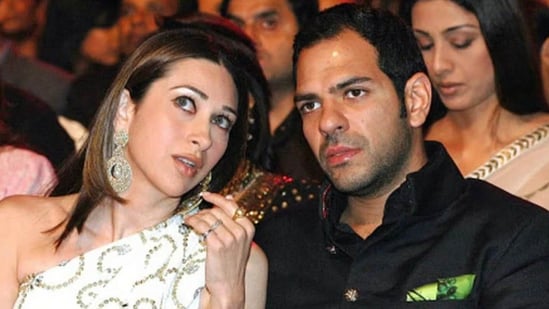The Delhi High Court on Tuesday (October 14) heard new claims in the ongoing inheritance dispute over the late industrialist Sunjay Kapur’s estate. The case, titled MS. Samaira Kapur & Anr v. Mrs. Priya Kapur & Ors, has drawn intense attention as actor Karisma Kapoor’s children, Samaira and Kiaan Kapur, challenge the authenticity of their father’s alleged will — a document they say is riddled with inconsistencies.
 Karisma Kapoor and Sunjay KapurA ‘testatrix’ instead of a testator
Karisma Kapoor and Sunjay KapurA ‘testatrix’ instead of a testator
Appearing before Justice Jyoti Singh, Senior Advocate Mahesh Jethmalani argued that the purported will could not have been signed by Sunjay Kapur, pointing out that “in certain crucial places in the purported Will of their late father, the feminine form of testator is used.” He added, “Given the wisdom of the deceased, it was not possible that the Will was signed by their father.”
The courtroom further heard that the will — allegedly executed digitally — refers to Sunjay Kapur as “she” and “her” multiple times, something Jethmalani described as “not just implausible but deeply incriminating.” “When you find ‘she’ and ‘her’ four times in a will supposedly written by Sunjay Kapur — a man known for precision and pride in his image — it’s impossible to believe he drafted it,” the lawyer said.
Drawing attention to one particular clause, Jethmalani read from the document: “Signed and declared by Sunjay Kapur the testatrix above named as and for her last will.” He remarked, “The female form of testator is used… testator is now a she! This is an absurdity… It shows the audacity which people have to present something like this in court… there is no explanation for this clause, there can’t be. Unless Sunjay was of unsound mind incapable of reading English, could never have signed this… In short, Sunjay Kapur has signed this Will as a woman. It is replete with feminine pronoun… It says ‘her last will’, ‘her presence’…”
Calling the will’s language “a document that would have ruined his reputation,” Jethmalani asserted that it undermines its own credibility.
‘An acute gambler’
In one of the hearing’s most charged moments, Jethmalani described Priya Kapur as “an acute gambler,” suggesting she had taken a chance on her husband’s legacy in pursuit of control. “Good luck to her,” he said, “but not at the cost of two children being robbed of their inheritance.”
While Priya Kapur’s counsel dismissed the petition as “greedy motives” on the part of Karisma Kapoor’s children, Jethmalani countered, “Everything they receive comes from their grandmother and father. You call them greedy? Your greed, Madam, is far greater — and it’s written into every line of this will.”
So, who made the will?
Jethmalani further argued that the defendants’ pleadings were silent on who actually prepared the will. “What we have is Sunjay Kapur — a meticulous person — has only an alleged digital footprint; that also in the entire conspectus he is a digital ghost. He does not appear physically. There is no handwriting, no evidence of photographs. There is only some oral evidence which is circumspect. The witnesses have not filed a detailed affidavit yet. Nobody knows what was the time and exact location,” he said.
He added that neither Defendant 1, Priya Kapur, nor the two witnesses to the will had stated who drafted it.
Leaves family out
Furthermore, the document, according to filings, makes no mention of Sunjay Kapur’s mother, Rani Kapur — a glaring omission, Jethmalani said, for someone who had always provided for her. “Her exclusion defies logic and decency,” he told the court. “It shows this document was not written by a son, but by someone who wanted his mother erased from the estate.”
He claimed Priya Kapur now controls 60% of the estate directly, 12% through her son, and 75% of the Kapur family trust, calling it “not inheritance” but “a takeover — under the guise of widowhood.”
Jethmalani also pointed out discrepancies including misspelt names, incorrect addresses, and an uncharacteristically informal tone. “These are not Sunjay’s words,” he said. “They are the words of someone pretending to be him.”
A web of contradictions
According to the counsel, the will suffers from “infirmities at every stage — preparation, circulation, and delivery.” He remarked, “There’s silence where there should be signatures,” adding that none of the parties associated with the document had clarified its origins.
Jethmalani also questioned why the will had never been registered, saying, “A man of his stature would not risk leaving a substantial personal estate open to dispute. If he intended Priya to be the sole beneficiary, he would have done it in writing, transparently, legally. Not like this.”
The next hearing
The hearing — now in its third round — continues to draw attention. The Delhi High Court will resume hearings on October 15.